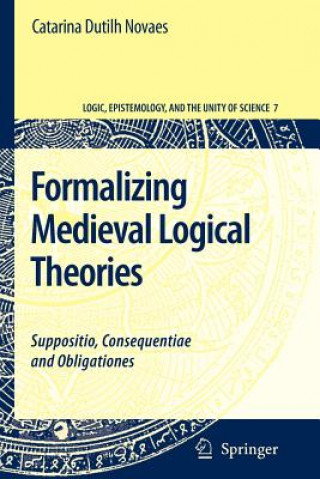
Kod: 01975620
Formalizing Medieval Logical Theories
Autor Catarina Dutilh Novaes
This book presents novel formalizations of three of the most important medieval logical theories: supposition, consequence and obligations. In an additional fourth part, an in-depth analysis of the concept of formalization is pres ... więcej
- Język:
 Angielski
Angielski - Oprawa: Miękka
- Liczba stron: 316
Wydawca: Springer, 2010
- Więcej informacji o książce

185.76 €

Dostępna u dostawcy w małych ilościach
Wysyłamy za 13 - 16 dni
Potrzebujesz więcej egzemplarzy?Jeżeli jesteś zainteresowany zakupem większej ilości egzemplarzy, skontaktuj się z nami, aby sprawdzić ich dostępność.
Dodaj do schowka
Zobacz książki o podobnej tematyce
-
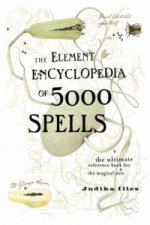
Element Encyclopedia of 5000 Spells
43.67 € -21 % -

Daniel's Winter Adventure
5.12 € -18 % -

Fahr Far Away
15.49 € -9 % -
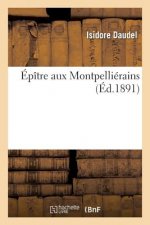
Epitre Aux Montpellierains
13.48 € -

Farringdon Without. a History of the Most Interesting Places, Leading Events; And Some Account of the Eminent Men Connected Therewith Since the Year 1
17.60 € -18 %
Podaruj tę książkę jeszcze dziś
- Zamów książkę i wybierz "Wyślij jako prezent".
- Natychmiast wyślemy Ci bon podarunkowy, który możesz przekazać adresatowi prezentu.
- Książka zostanie wysłana do adresata, a Ty o nic nie musisz się martwić.
Więcej informacji o Formalizing Medieval Logical Theories
Za ten zakup dostaniesz 467 punkty
 Opis
Opis
This book presents novel formalizations of three of the most important medieval logical theories: supposition, consequence and obligations. In an additional fourth part, an in-depth analysis of the concept of formalization is presented a crucial concept in the current logical panorama, which as such receives surprisingly little attention.§Although formalizations of medieval logical theories have been proposed earlier in the literature, the formalizations presented here are all based on innovative vantage points: supposition theories as algorithmic hermeneutics, theories of consequence analyzed with tools borrowed from model-theory and two-dimensional semantics, and obligations as logical games. For this reason, this is perhaps the first time that these medieval logical theories are made fully accessible to the modern philosopher and logician who wishes to obtain a better grasp of them, but who has always been held back by the lack of appropriate translations into modern terms.§Moreover, the book offers a reflection on the very nature of logic, a reflection that is prompted by the comparisons between medieval and modern logic, their similarities and dissimilarities. It is thus a contribution not only to the history of logic, but also to the philosophy of logic, the philosophy of language and semantics.§The analysis of medieval logic is also relevant for the modern philosopher and logician in that, being the unifying methodology used across all disciplines at that time, logic really provided unity to science. It thus presents a unified model of scientific investigation, where logic plays the aggregating role.This book presents formalizations of three important medieval logical theories: supposition, consequence and obligations. These are based on innovative vantage points: supposition theories as algorithmic hermeneutics, theories of consequence analyzed with tools borrowed from model-theory and two-dimensional semantics, and obligations as logical games. The analysis of medieval logic is relevant for the modern philosopher and logician. This is the first book to render medieval logical theories accessible to the modern philosopher.This book presents novel formalizations of three of the most important medieval logical theories: supposition, consequence and obligations. In an additional fourth part, an in-depth analysis of the concept of formalization is presented a crucial concept in the current logical panorama, which as such receives surprisingly little attention.§Although formalizations of medieval logical theories have been proposed earlier in the literature, the formalizations presented here are all based on innovative vantage points: supposition theories as algorithmic hermeneutics, theories of consequence analyzed with tools borrowed from model-theory and two-dimensional semantics, and obligations as logical games. For this reason, this is perhaps the first time that these medieval logical theories are made fully accessible to the modern philosopher and logician who wishes to obtain a better grasp of them, but who has always been held back by the lack of appropriate translations into modern terms.§Moreover, the book offers a reflection on the very nature of logic, a reflection that is prompted by the comparisons between medieval and modern logic, their similarities and dissimilarities. It is thus a contribution not only to the history of logic, but also to the philosophy of logic, the philosophy of language and semantics.The analysis of medieval logic is also relevant for the modern philosopher and logician in that, being the unifying methodology used across all disciplines at that time, logic really provided unity to science. It thus presents a unified model of scientific investigation, where logic plays the aggregating role.
 Szczegóły książki
Szczegóły książki
Kategoria Książki po angielsku Humanities Philosophy History of Western philosophy
185.76 €
- Pełny tytuł: Formalizing Medieval Logical Theories
- Podtytuł: Suppositio, Consequentiae and Obligationes
- Autor: Catarina Dutilh Novaes
- Język:
 Angielski
Angielski - Oprawa: Miękka
- Liczba stron: 316
- EAN: 9789048174584
- ISBN: 9048174589
- ID: 01975620
- Wydawca: Springer
- Waga: 504 g
- Wymiary: 235 × 155 × 17 mm
- Data wydania: 25. November 2010
Ulubione w innej kategorii
-

Meditations
9.85 € -16 % -

Aphorisms on Love and Hate
4.02 € -12 % -

Why I Am so Clever
3.91 € -15 % -

The Myth of Sisyphus
8.04 € -

Twilight of the Idols with The Antichrist and Ecce Homo
5.42 € -26 % -

Letters from a Stoic
12.27 € -14 % -

Gay Science
12.57 € -21 % -

Beyond Good and Evil
9.35 € -34 % -

Ride the Tiger
20.92 € -18 % -

Things Hidden Since the Foundation of the World
31.19 € -5 % -

Simulacra and Simulation
23.24 € -

Human, All Too Human & Beyond Good and Evil
5.83 € -20 % -

Spell of the Sensuous
17.10 € -14 % -

Existentialism Is a Humanism
8.95 € -19 % -

Thus Spoke Zarathustra
9.35 € -29 % -
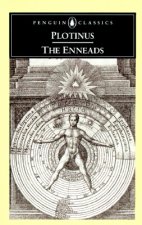
Enneads
15.19 € -28 % -
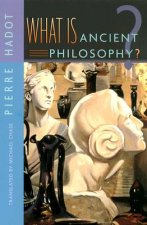
What Is Ancient Philosophy?
39.24 € -
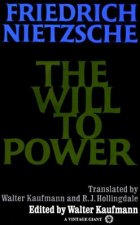
Will to Power
18 € -9 % -
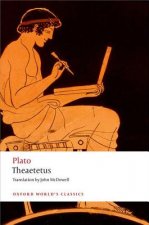
Theaetetus
12.27 € -28 % -

The Trouble With Being Born
11.76 € -26 % -
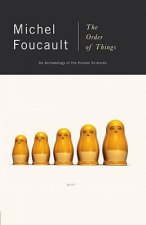
Order of Things
14.88 € -25 % -
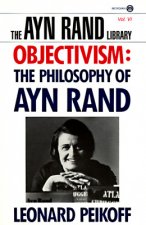
Objectivism: the Philosophy of Ayn Rand
18.21 € -20 % -
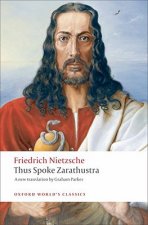
Thus Spoke Zarathustra
10.25 € -28 % -

Sartre's 'Being and Nothingness'
91.67 € -
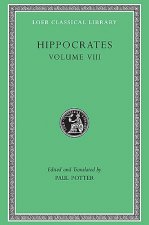
Places in Man. Glands. Fleshes. Prorrhetic 1-2. Physician. Use of Liquids. Ulcers. Haemorrhoids and Fistulas
36.02 € -
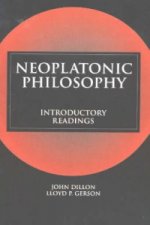
Neoplatonic Philosophy
28.07 € -4 % -
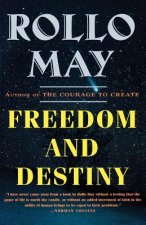
Freedom and Destiny
20.02 € -15 % -

Deleuze and Guattari's A Thousand Plateaus
27.77 € -10 % -
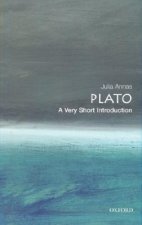
Plato: A Very Short Introduction
9.25 € -28 % -
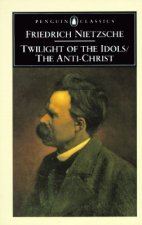
Twilight of Idols and Anti-Christ
11.36 € -11 % -
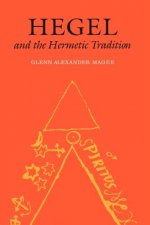
Hegel and the Hermetic Tradition
31.69 € -9 % -

C. S. Lewis
31.99 € -

Steps to an Ecology of Mind
26.66 € -

Meditations
16.09 € -17 % -

Either/Or
19.41 € -

Nausea
11.06 € -22 % -

Meditations
20.52 € -17 % -

Discourses and Selected Writings
10.56 € -26 % -

The Symposium
9.35 € -23 % -

Myth of Sisyphus
11.06 € -22 % -
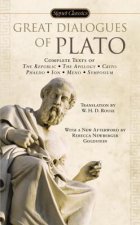
Great Dialogues Of Plato
8.44 € -
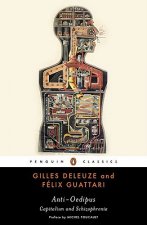
Anti-Oedipus
19.71 € -17 % -
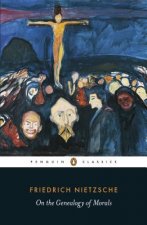
On the Genealogy of Morals
11.06 € -16 % -

Phenomenology of Spirit
37.23 € -5 % -

Nicomachean Ethics
5.02 € -31 % -
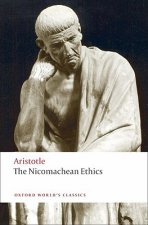
Nicomachean Ethics
10.96 € -4 % -
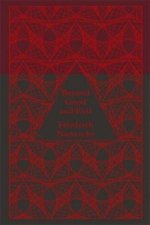
Beyond Good and Evil
15.29 € -22 % -

Fear and Trembling
11.06 € -22 % -

Treatise of Human Nature
14.18 € -21 %
Osobní odběr Bratislava a 2642 dalších
Copyright ©2008-24 najlacnejsie-knihy.sk Wszelkie prawa zastrzeżonePrywatnieCookies


 Vrácení do měsíce
Vrácení do měsíce Zdarma od 49.99 €
Zdarma od 49.99 € 02/210 210 99 (8-15.30h)
02/210 210 99 (8-15.30h)